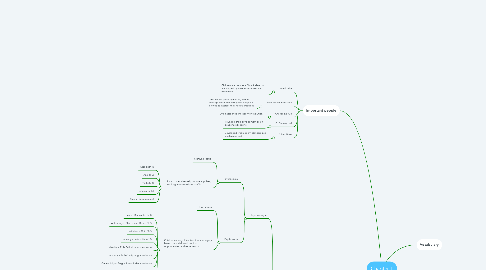
1. Important people
1.1. John Locke
1.1.1. Children are born as a "blank slate" and are shaped by their environment and experience
1.2. Jean-Jaques Rousseau
1.2.1. Children are good by nature, and will develop into moral and giving people if allowed to express their natural impulses
1.3. Charles Darwin
1.3.1. Originated modern theory of evolution
1.4. G. Stanley Hall
1.4.1. Founded child development as an academic discipline
1.5. Alfred Binet
1.5.1. Developed first modern standardized intelligence test
2. Perspectives on child development
2.1. Psychoanalytic
2.1.1. Psychosexual
2.1.1.1. Sigmund Freud
2.1.1.2. Social codes channel primitive impulses, resulting in unconscious conflict
2.1.1.2.1. Oral (birth-1)
2.1.1.2.2. Anal (1-3)
2.1.1.2.3. Phallic (3-6)
2.1.1.2.4. Latency (6-12)
2.1.1.2.5. Genital (adolescence)
2.1.2. Psychosocial
2.1.2.1. Erik Erikson
2.1.2.2. Children undergo life crises that are largely based on social relationships, opportunities, and expectations
2.1.2.2.1. Trust v. Mistrust (birth-1)
2.1.2.2.2. Autonomy v. Shame and Doubt (1-3)
2.1.2.2.3. Initiative v. Guilt (3-6)
2.1.2.2.4. Industry v. Inferiority (6-12)
2.1.2.2.5. Identity v. Role Diffusion (adolescence)
2.1.2.2.6. Intimacy v. Isolation (young adulthood)
2.1.2.2.7. Generativity v. Stagnation (middle adulthood)
2.1.2.2.8. Ego Integrity v. Despair (late adulthood)
2.2. Learning
2.2.1. Behaviorism
2.2.1.1. John B. Watson
2.2.1.2. Behavior is learned by association, such as in classical and operant conditioning
2.2.2. Social Cognitive
2.2.2.1. Albert Bandura
2.2.2.2. Children learn by observing others, and choose whether to display responses learned by conditioning
2.3. Cognitive
2.3.1. Cognitive-Developmental
2.3.1.1. Jean Piaget
2.3.1.2. Children adapt to the environment by assimilating new events to existing mental structures and accommodating those structures
2.3.2. Information-processing
2.3.2.1. Numerous theorists
2.3.2.2. Children's cognitive functioning is compared to that of computers- how they input, manipulate, store, and output information
2.4. Biological
2.4.1. Ethology and Evolution
2.4.1.1. Charles Darwin, Konrad Lorens, Niko Tinbergen
2.4.1.2. Organisms are biologically "prewired" to develop certain adaptive responses during sensitive periods
2.5. Ecological
2.5.1. Ecological Systems
2.5.1.1. Urie Bronfenbrenner
2.5.1.2. Children's development occur within interlocking systems, and development is enhanced by intervening in these systems
2.6. Sociocultural
2.6.1. Sociocultural
2.6.1.1. Lev Vygotsky
2.6.1.2. Children internalize sociocultural dialogues in developing problem-solving skills
2.6.2. Sociocultural and Human Diversity
2.6.2.1. Numerous theorists
2.6.2.2. Children's development is influenced by sociocultural factors, such as ethnicity, gender, and socioeconomic status
3. How we study child development
3.1. Scientific method
3.1.1. Hypothesis, test, conclusion, publish
3.1.2. Naturalistic observation
3.1.3. Case studies
3.2. Ethics
3.2.1. Test may not cause harm
3.2.2. Participation must be voluntary

